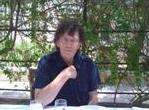Luc Reychler
Luc E.H.G. Reychler (pronounced [ˈlyk ˈrɛixlər]; born December 30, 1944) is a Belgian social and political scientist.

His work focuses on following themes:
- diplomatic thinking
- sustainable peacebuilding architecture
- peace negotiation
- conflict and peace impact assessment
- genocide
- failed foreign policy
- intellectual solidarity
- the role of time in conflict and peace dynamics.
Early life and studies
Born in Eeklo, East Flanders, Luc Reychler studied industrial and forensic psychology at the University of Ghent. At the London School of Economics and the University of Oslo, he was introduced to the study of international relations, strategic studies, conflict resolution and peace research. In Harvard, he specialized in the political psychology of international relations and received a Ph.D in 1976 with a thesis on ‘Patterns of diplomatic thinking: a cross national study of structural and social-psychological determinants’.[1]
Career
Luc Reychler became professor international relations and peace research at the University of Leuven. In 2004, he was elected secretary general of the International Peace Research Association (IPRA), where he served until 2008. He introduced new concepts such as: diplomatic thinking, peace architecture, conflict impact assessment system (CIAS), field diplomacy (‘terreindiplomatie’, in Dutch) and peace quack (‘paxzalver’, in Dutch).
Present occupation
As professor emeritus, Luc Reychler uses his newly found academic freedom, to write on (a) the role of time in conflict and peace dynamics and (b) on the theory of sustainable peacebuilding architecture. He also speaks out about sensitive issues; The Speak Out Notes can be found on diplomaticthinking.com.[2]
He lives in Binkom and has a son.
Selected bibliography
- Patterns of diplomatic thinking (1979) (ISBN 0-03-046636-9)
- Een onvoltooid beleid: Belgische buitenlandse en defensiepolitiek (1993) (ISBN 90 289 1765 9)
- The art of conflict prevention (1994) (ISBN 1-85753-105-1)
- Nieuwe muren: overleven in een andere wereld (1994) (ISBN 978-90-6186-588-9)
- Een wereld veilig voor conflict: handboek voor vredesonderzoek (1995) (ISBN 90-5350-332-3)
- De agressie voorbij: terreindiplomatie (1995) (ISBN 90 5466 192 5)
- Democratic peace-building and conflict prevention: the devil is in the transition (1999) (ISBN 90 6186 985 4)
- Le défi de la paix au Burundi: Théorie & Pratique(1999) (ISBN 2-7384-7343-1)
- Peace building: a field guide (2001) (ISBN 1-55587-912-8)
- De volgende genocide (2004) (ISBN 9789058674265)
- Aid for peace (2009)
References
- Reychler, Luc (1979)."Patterns of diplomatic thinking". ISBN 0-03-046636-9.
- "Diplomatic thinking". Diplomatic thinking. Retrieved 2012-03-18.